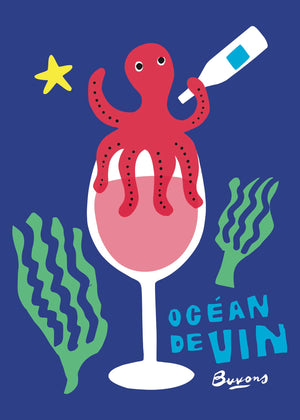
Grapes: Sauvignon Blanc + Morillon
Region: Styria, Austria
Vintage: 2021
Viticulture: Organic + Biodynamic
Soils: Opok - Limestone + Clay Silt
Vinification: Grapes are hand-harvested and half of them are destemmed. The grapes then macerate on the skins for 12 months
Aging: 1200-liter oval wooden tanks for elevage for about 20 months
Fining or Filtering: None
Sulfur: None added
Notes from the Importer: Erde means “earth” in German, reminiscing where it all begins for good natural wine, as well as the earthiness of this long-skin-contact cuvée, born of hrapes macerated for up to 12 months.
Personality: quite something. Very herbal, out there on the ripe fruit aromas, the signature dense earthiness. Take this wine out on a date and be ready to only come home after 3 days or so. Or maybe a week.
Rolling, lush green hills reminiscent of Tolkien’s Hobbit, an ancient, painstakingly restored bright yellow country house atop one of those knolls, a kitchen the size of a small classroom with a generously-sized dining table and a huge traditional tile stove with simmering pots right next to it: zooming into the vivid and homely setting of Sepp & Maria Muster’s South Styrian home is almost too much to take in even for a seasoned wine traveler. Unique beauty and energy radiate from both the 300-year-old house and the wisdom of the vineyards that immediately surround it (best commute ever), and the same calm yet gripping vibe, unsurprisingly, also oozes from the couple’s elegant whites, reds, and skin-contact wines.
Inspired by encounters with biodynamic agriculture and several years spent in India and Australia, the couple knew this was the only way they wanted to farm when taking the helm of the estate from Sepp’s father in 2000. “We discovered quickly that the soil is where everything begins. Vitality in the soil leads to vitality in the plant, and ultimately, in every bottle of wine,” Sepp explains their simple yet complex philosophy. Since the vineyards have never seen any herbicides or pesticides, the conversion went rather smoothly, and the vineyards have been certified by the Demeter Association since 2003. “Caring for our vines is like caring for a friend – we support them where we can with biodynamic preparations and teas, and in exchange, they provide us with small and highly aromatic grapes,” they muse. And like in true friendship, there’s also freedom, and a touch of uncertainty about what the future holds: “Nature is unpredictable, and having a strict plan does not always work in humans’ favor. Understanding that allowed us to accept and balance this lack of security, and we feel that we have grown more open and aware because of it,” Maria attests to their belief that nature can’t be controlled, only worked with.
The vineyards are planted with locally typical Sauvignon, Chardonnay, Welschriesling, Gelbmuscateller and Zweigelt, Blaufrankisch and Blauer Wildbacher, trellised on a single-wire system supported by chestnut wood poles. “It’s a traditional, established solution, perfectly suited to our region and our soil,” Sepp praises this solution’s virtues as we climb the steep slopes of his mighty Opok. This mix of limestone, clay, and silt is so essential to the wines’ character, endowing them with a rich texture and distinct minerality, that the Musters named one of their wine ranges after it. In order to preserve these unique traits as much as possible, the cellar work is kept to a minimum: “I don’t really go here much,” Sepp nods with a smile when the tour continues in his cellar.
The bunker-looking room full of barrels of various sizes also houses several big clay amphoras; when asked about his preference, Sepp just laughs and recalls how he used to age the same wine in both clay and barrel: “If I told people during the tasting which is which and asked their preference, they’d usually go for the amphora; if I didn’t tell them, they mostly preferred the barrel-aged one. In the end, I thought, whatever, with the way we work it’s not that important anyway, and now I mostly blend it if I use both vessels… but it’s nice to have some new gadgets to play around with sometimes,” he chuckles. Other than that, there aren’t many other gadgets around indeed; the wines are gently hand-harvested, spontaneously fermented and then left to their own devices for 18 months or more: “Inaction is just as important as action. It’s essential to do the right thing at the right moment.”
The result of these actions and inactions is then bottled without further intervention (including sulfur) and dotted with simple yet beautiful labels painted by Maria & Sepp’s friend, artist Beppo Pliem. Just as all the other aspects of Muster wines, they are compellingly meditative and carry a powerful message: “The greatest of all misconceptions is that all is in order. But it is not; no order, no explanations, no answers. Shortly before his passing, our friend found his answers on the horizon and in a reduction to the essentials. Since then, his paintings adorn our bottles and are thus an expression of natural interaction between earth, sky, and grape. The wine, coming out of this symbiosis, is our own personal idea of freedom and responsibility.”




